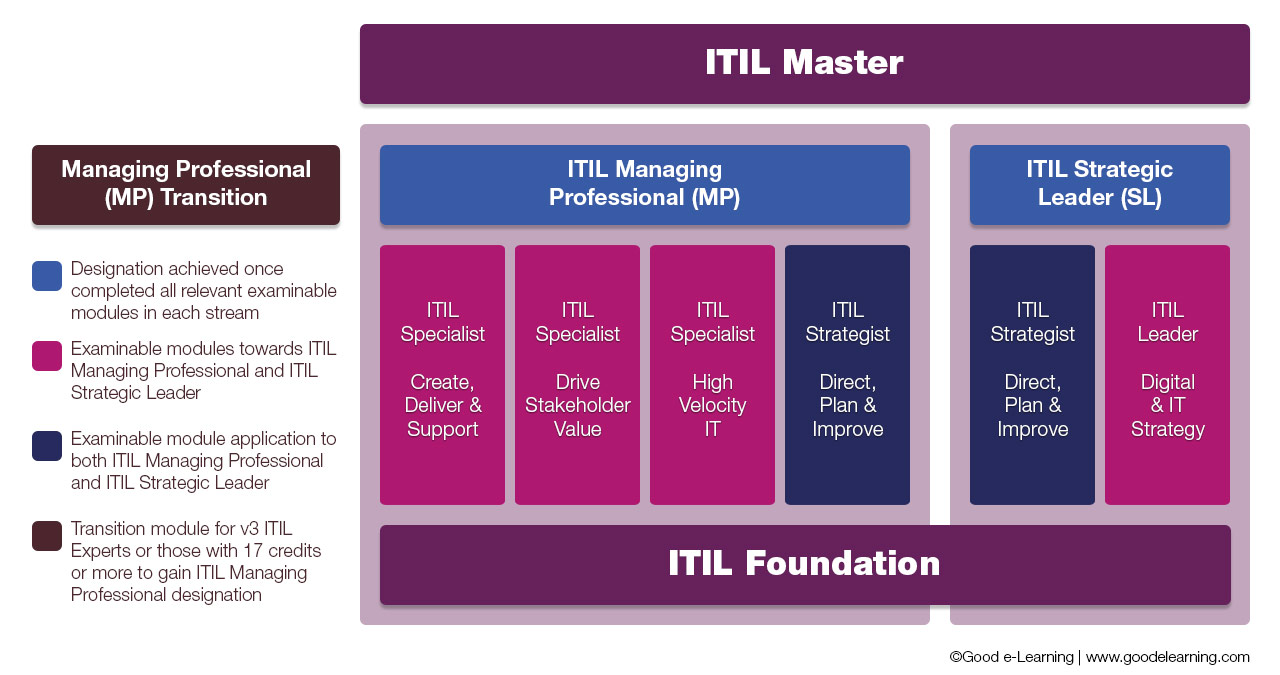The ITIL 4 Practitioner: Service Request Management course is for IT professionals who want to support the agreed quality of a service by handling all predefined, user-initiated service requests in an effective and user-friendly manner.
The individuals can demonstrate their understanding and application of the concepts covered in the ITIL 4 Service Request Management practice at both strategic and operational levels maximizing value from this practice area.
ITIL 4 Practitioner: Service Request Management enables professionals to efficiently
Duration: 55m
Module zero introduces you to the course main features, learning plan, aims and objectives, and structure.
It also offers a syllabus, a diagram and tables pack, a further reading and links document and links to download essential copies of the framework publications. It also contains some of the most frequently asked questions about ITIL 4 Service Request Management Practice.
Duration: 1h
Module 1 explains the purpose and some key terms and concepts of the service request management practice. It then describes the practice success factors (PSFs) and the key metrics of the service request management practice.
Duration: 1h
Module 2 begins with an explanation of the two service request management practice processes: Service request fulfillment control and service request review and optimization. It describes the inputs, outputs and key activities of both processes and how to integrate the service request management practice in the organization’s value streams.
The module goes on to describe the organizations and people involved in the practice. It describes the responsibilities of the key roles and how to position the service request management practice in the organizational structure.
Duration: 1h
Module 3 completes the content for this course with a description of further concepts that enable the service request management practice.
We start by explaining automation and tooling, and providing recommendations for the automation of service request management.
The module goes on to discuss partners and suppliers, explaining the dependencies of the practice on third parties and how partners and suppliers can support the practice.
Capability is the next topic to be covered, with an explanation of how capability criteria support the practice capability development.
The module ends with recommendations for service request management practice success and how they’re supported by the ITIL guiding principles.
Duration: 1h 5m
Module 4 contains two practice tests provided by PeopleCert.
Duration: 5m
Module 5 provides information on booking the exam and other courses of interest.
PeopleCert Exam Information
Your exam voucher will be sent to you shortly after you purchase your course. The exam voucher must be redeemed on the PeopleCert website before starting your course. Redeeming the exam voucher allows customers to access the official eBook.
PeopleCert exams can be taken online, through your web browser or using ExamShield proctoring software. Candidates choose how to take their exam in their account area on the PeopleCert website.
PeopleCert operate an exam insurance scheme called Take2. If you would like the opportunity to retake the exam , you must purchase Take2 before taking your exam.
Take2 can be purchased through your PeopleCert account up to 15 minutes before your exam.
Alternatively, you can become a PeopleCert Plus member to receive a free resit for all certifications you take.
You can find detailed information on PeopleCert exam terms and conditions on our exams terms and conditions page.
What is included?
ITSM stands for ‘IT Service Management’. It involves using policies, procedures, and best practices to optimize IT services for clients and employees.
‘ITIL 4’ is the latest iteration of ITIL, the world’s leading framework for ITSM. It offers a series of best practices to help IT-powered organizations design, develop, and continually improve their IT services.
Previously, ITIL stood for the ‘Information Technology Infrastructure Library’. The framework has evolved to the point where it is updated so often that it cannot be considered a static ‘library’. Because of this, the name no longer stands for anything.
Students start with ‘ITIL Foundation’. Passing the Foundation exam then enables them to choose modules in the ‘Managing Professional’ or ‘Strategic Leader’ streams.

According to Payscale, certified ITIL practitioners can earn between $51,000 and over $259,000 (or £18,000 and over £118,000), depending on their experience, role, and certification level. Even sitting a Foundation course can have significant benefits for ITSM professionals.
ITIL provides users with a set of best practices for creating optimized IT services. It establishes cultures of continuous improvement, ensuring that users can enjoy long-term benefits with IT services continually aligned with business goals and strategies. It also offers proven practices for resource optimization and continuous improvement.
ITIL 4 is a modern framework that fully equips users to optimize their IT practices. It creates cultures of continuous improvement, enabling organizations to deliver top-quality IT products and services whilst also continually reviewing their own processes.
The framework is also highly adaptable and can work alongside other popular approaches, such as DevOps. Finally, the framework is set to continue evolving to accommodate developments in technology and best practices. This makes ITIL future-proof for practitioner organizations.
‘ITIL v4’ is ITIL 4. Previous iterations of the framework were treated as ‘versions’, resulting in names like ‘v3’. However, ITIL 4 does not follow the same format, as it will be updated on a regular basis.
There were three major changes with the release of ITIL 4. Firstly, it is more industry and community-driven, with practitioners helping to update the framework. Next, it can be easily integrated with other popular frameworks, such as DevOps, Agile, and Lean. The new framework also has an updated certification path.
AXELOS is a joint venture company behind a variety of highly popular best practice frameworks, including ITIL 4, PRINCE2, MSP, and AgileSHIFT.
ITIL 4 can be integrated with several other frameworks, including Agile, DevOps, and Lean. Some practitioners even use it alongside PRINCE2.
The ITIL 4 Practitioner: Service Request Management course is for IT professionals who want to support the agreed quality of a service by handling all predefined, user-initiated service requests in an effective and user-friendly manner.
The individuals can demonstrate their understanding and application of the concepts covered in the ITIL 4 Service Request Management practice at both strategic and operational levels maximizing value from this practice area.
ITIL 4 Practitioner: Service Request Management enables professionals to efficiently
Duration: 55m
Module zero introduces you to the course main features, learning plan, aims and objectives, and structure.
It also offers a syllabus, a diagram and tables pack, a further reading and links document and links to download essential copies of the framework publications. It also contains some of the most frequently asked questions about ITIL 4 Service Request Management Practice.
Duration: 1h
Module 1 explains the purpose and some key terms and concepts of the service request management practice. It then describes the practice success factors (PSFs) and the key metrics of the service request management practice.
Duration: 1h
Module 2 begins with an explanation of the two service request management practice processes: Service request fulfillment control and service request review and optimization. It describes the inputs, outputs and key activities of both processes and how to integrate the service request management practice in the organization’s value streams.
The module goes on to describe the organizations and people involved in the practice. It describes the responsibilities of the key roles and how to position the service request management practice in the organizational structure.
Duration: 1h
Module 3 completes the content for this course with a description of further concepts that enable the service request management practice.
We start by explaining automation and tooling, and providing recommendations for the automation of service request management.
The module goes on to discuss partners and suppliers, explaining the dependencies of the practice on third parties and how partners and suppliers can support the practice.
Capability is the next topic to be covered, with an explanation of how capability criteria support the practice capability development.
The module ends with recommendations for service request management practice success and how they’re supported by the ITIL guiding principles.
Duration: 1h 5m
Module 4 contains two practice tests provided by PeopleCert.
Duration: 5m
Module 5 provides information on booking the exam and other courses of interest.
PeopleCert Exam Information
Your exam voucher will be sent to you shortly after you purchase your course. The exam voucher must be redeemed on the PeopleCert website before starting your course. Redeeming the exam voucher allows customers to access the official eBook.
PeopleCert exams can be taken online, through your web browser or using ExamShield proctoring software. Candidates choose how to take their exam in their account area on the PeopleCert website.
PeopleCert operate an exam insurance scheme called Take2. If you would like the opportunity to retake the exam , you must purchase Take2 before taking your exam.
Take2 can be purchased through your PeopleCert account up to 15 minutes before your exam.
Alternatively, you can become a PeopleCert Plus member to receive a free resit for all certifications you take.
You can find detailed information on PeopleCert exam terms and conditions on our exams terms and conditions page.
What is included?
ITSM stands for ‘IT Service Management’. It involves using policies, procedures, and best practices to optimize IT services for clients and employees.
‘ITIL 4’ is the latest iteration of ITIL, the world’s leading framework for ITSM. It offers a series of best practices to help IT-powered organizations design, develop, and continually improve their IT services.
Previously, ITIL stood for the ‘Information Technology Infrastructure Library’. The framework has evolved to the point where it is updated so often that it cannot be considered a static ‘library’. Because of this, the name no longer stands for anything.
Students start with ‘ITIL Foundation’. Passing the Foundation exam then enables them to choose modules in the ‘Managing Professional’ or ‘Strategic Leader’ streams.

According to Payscale, certified ITIL practitioners can earn between $51,000 and over $259,000 (or £18,000 and over £118,000), depending on their experience, role, and certification level. Even sitting a Foundation course can have significant benefits for ITSM professionals.
ITIL provides users with a set of best practices for creating optimized IT services. It establishes cultures of continuous improvement, ensuring that users can enjoy long-term benefits with IT services continually aligned with business goals and strategies. It also offers proven practices for resource optimization and continuous improvement.
ITIL 4 is a modern framework that fully equips users to optimize their IT practices. It creates cultures of continuous improvement, enabling organizations to deliver top-quality IT products and services whilst also continually reviewing their own processes.
The framework is also highly adaptable and can work alongside other popular approaches, such as DevOps. Finally, the framework is set to continue evolving to accommodate developments in technology and best practices. This makes ITIL future-proof for practitioner organizations.
‘ITIL v4’ is ITIL 4. Previous iterations of the framework were treated as ‘versions’, resulting in names like ‘v3’. However, ITIL 4 does not follow the same format, as it will be updated on a regular basis.
There were three major changes with the release of ITIL 4. Firstly, it is more industry and community-driven, with practitioners helping to update the framework. Next, it can be easily integrated with other popular frameworks, such as DevOps, Agile, and Lean. The new framework also has an updated certification path.
AXELOS is a joint venture company behind a variety of highly popular best practice frameworks, including ITIL 4, PRINCE2, MSP, and AgileSHIFT.
ITIL 4 can be integrated with several other frameworks, including Agile, DevOps, and Lean. Some practitioners even use it alongside PRINCE2.
Price Excludes VAT
$359.00
Good e-Learning achieves what many thought was not possible – an online course that is straight forward and gets some very complex material across in a fun and engaging manner. The materials are illustrated with easy-to-follow graphics, voice-overs and videos that make the subject matter memorable – especially important for preparing for the exam!

"*" indicates required fields